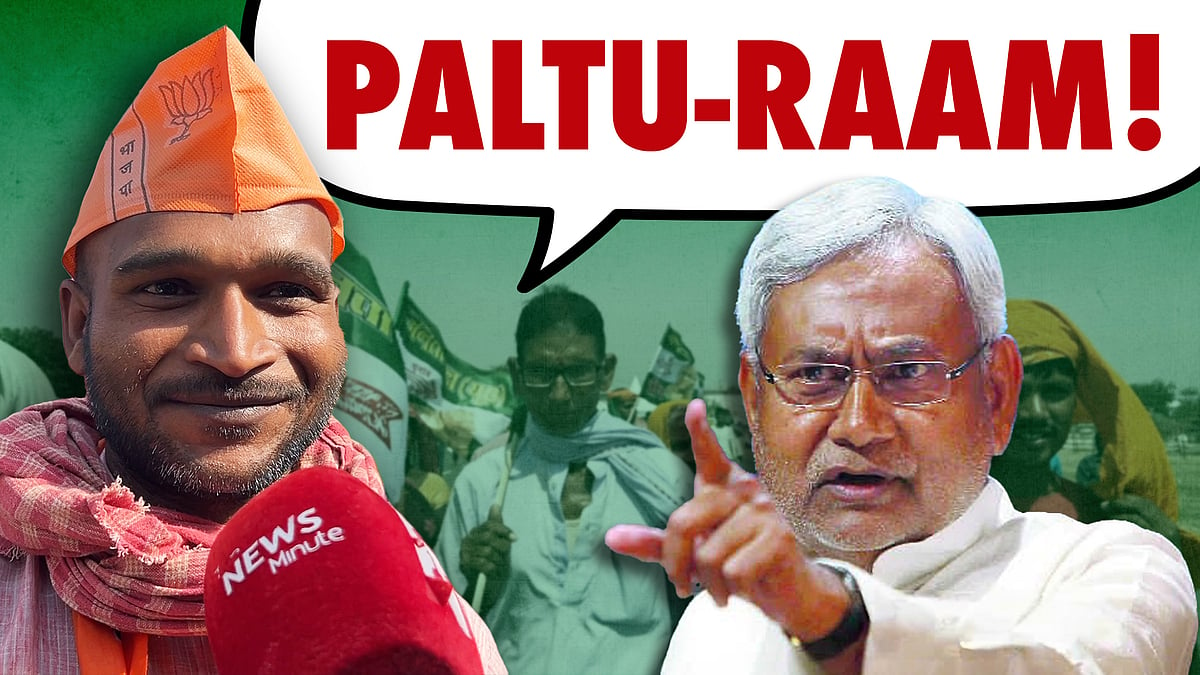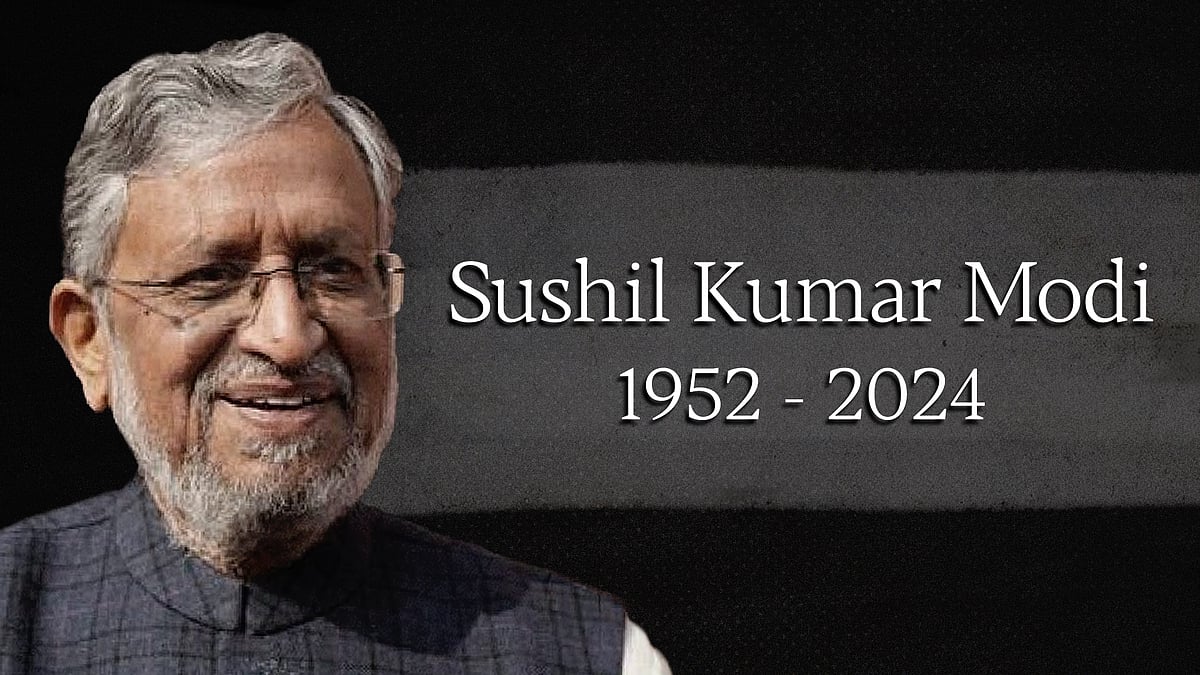Sushil Kumar Modi: A dignified voice in the combative world of Bihar politics
The BJP leader and former deputy CM of Bihar, who was battling cancer, died yesterday.
In late January this year, when Bihar was gearing up for another round of political realignment, there was the usual media chatter about the formation of a new government. As reporters rushed to a feeble-looking Sushil Kumar Modi for some clues, he was as measured as usual – finding the right words for what he wanted to say on the Bharatiya Janata Party’s behalf and deflecting what wasn’t relevant.
Few knew he was battling cancer at the time, a diagnosis he only publicly disclosed last month.
Among the many facets of his journey of over five decades in public life, Modi could be remembered as one of the last links to a bygone era of political sobriety and reasoned conduct in the combative politics of Bihar.
In many ways, in the post-Kailashpati Mishra era, Sushil Kumar Modi was the tallest BJP leader in Bihar, even though certain factors forced his sidelining in the last few years. Born in 1952 and a botany graduate from the once prestigious Patna Science College, he cut his political teeth – like many of his generation did in Bihar – in the campus politics of Patna University. He was later part of the Bihar movement led by Jayaprakash Narayan and was incarcerated during the Emergency years.
Though a product of the JP movement like Lalu Prasad Yadav and Nitish Kumar, Sushil Modi stuck to the right-of-centre stream of politics in the state. After holding various leadership positions in the Akhil Bharatiya Vidyarthi Parishad, he joined the BJP and first entered the Bihar legislative assembly in 1990, after winning the Patna Central seat. He even became the party’s chief whip in the house during the initial years of Lalu’s 15-year governance.
But it was Sushil Modi’s role as leader of the opposition from 1996 to 2004 that brought him into the spotlight for his dogged pursuit of corruption cases against the Lalu government in Bihar. In 1996, he filed a PIL in the Patna High Court asking for an investigation into what is now famously known as the fodder scam case, in which Lalu would later be convicted. He also infused energy into the opposition’s campaign against misrule and graft charges against the governing Rashtriya Janata Dal.
This was a time when the BJP – which had been spearheaded by Kailashpati Mishra in Bihar since the Jan Sangh days – was not an electoral force to reckon with in large parts of the state. The party, with Sushil Modi as leader of the opposition, grasped the pragmatic need to ally with Lohiaite parties like the Samata Party, which later became the Janata Dal United, to challenge the social arithmetic of the RJD-led alliance.
It was in this context that Sushil Modi’s role in crafting the contours of the NDA in Bihar was significant in two ways.
First, he was able to convince his party’s leadership about the need to include OBCs as the NDA’s major support base. For this, the BJP needed to aim for a wider social coalition.
Second, in pursuing the first goal, he also made his party take note of the fact that Nitish Kumar, a Lohiaite backward class leader, was a better bet to lead the NDA in Bihar. When the NDA government was formed in 2005, Sushil Modi had a long stint as the deputy chief minister till 2013, the year in which Chief Minister Nitish Kumar snapped ties with the BJP. This was also a year when a spell of alignments and realignments was set off in Bihar as Nitish started switching allies. In 2017, when Nitish allied with BJP again, Sushil Modi was back as deputy chief minister.
There was a pervasive sense that Sushil Modi served as the bridge between the BJP and Nitish, his friend from Patna University days, which made the NDA tide over differences. At the same time, Sushil Modi, who was the state’s finance minister as well, was credited with efficient financial management of Bihar, even leading to a turnaround in state finances.
In July 2011, with the UPA in power at the centre, he was elected chairperson of the Empowered Committee of State Finance Ministers on GST. That put him at the forefront of the deliberative process of adopting GST with centre-state interests in view.
One may argue that it was after the 2020 assembly polls that there were signs of the central leadership clipping Sushil Modi’s wings in the state unit. He did not retain the deputy CM post even though the NDA was voted back to power. A reason cited for this was that his perceived proximity to CM Nitish rankled party cadre to the extent that Sushil Modi was seen as “Nitish’s man in the BJP”. There was also a line of reasoning that he was replaced as deputy CM because of the BJP’s plan to make inroads into the EBC vote base, which was why two EBC leaders – Renu Devi and Tarkeshwar Prasad – were chosen instead.
That, however, meant Sushil Modi had to be given a role in the organisation or be brought to the centre. So, he was elected to the Rajya Sabha unopposed.
Sushil Modi’s speeches in the Rajya Sabha did not go unnoticed, particularly on policy matters. His experience in handling the state finance portfolio stood him in good stead as a parliamentarian. One of his recent interventions in the Rajya Sabha was on the precarious nature of ‘freebies’ budgeting – a speech which got wide coverage in the media. Along with this, he was a keen contributor of articles to newspapers, mostly writing on policy issues.
In the last few years of his public life, his detractors in the state unit often accused him of being a “Patna tied “leader, alluding to the perception that he was not in touch with the state beyond the state capital. He would often retort by saying that no leader has travelled the state as extensively as he has done.
Keeping such claims aside, there are many anecdotes about his accessibility and readiness to attend all kinds of social events in remote areas, if invited. The charge of a tacit understanding with Nitish must also be measured against the consistent attack he led against the Nitish Kumar-led government in the phases when the JDU parted ways with the BJP – from 2013 to 2017 and then from 2022 to January 2024. One can’t look away from the fact that when the party needed to mount a concerted, issue-based and reasoned attack on the state government, and not merely tirades, Sushil Modi was consistently the man doing the job. The nature of his daily takes on political developments in the state almost had the ring of daily bulletin.
Across the political divide of rival persuasions and interests, Sushil Kumar Modi reminded power alleys of Patna of the possibility of an alternative stylebook of dignified political combat. He showed it need not be a vestige of the past, as stringent views can find a political vocabulary to express themselves. He did that day in and day out for decades, sometimes too often. Besides being one of the key architects of his party’s presence in his state, his consistency as a decent political messenger should linger in Bihar’s public memory.
If you’re reading this story, you’re not seeing a single advertisement. That’s because Newslaundry powers ad-free journalism that’s truly in public interest. Support our work and subscribe today.
 Is the Nitish factor dying down in BJP’s battle for Bihar?
Is the Nitish factor dying down in BJP’s battle for Bihar?NL Digest
A weekly guide to the best of our stories from our editors and reporters. Note: Skip if you're a subscriber. All subscribers get a weekly, subscriber-only newsletter by default.
